|
|
|
Sort Order |
|
|
|
Items / Page
|
|
|
|
|
|
|
| Srl | Item |
| 1 |
ID:
158665
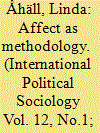

|
|
|
|
|
| Summary/Abstract |
International relations scholars are increasingly paying attention to “the emotional” as a way to understand global politics. What is often missing from these conversations is feminist knowledge on affect, and also discussions about methodology. By presenting a feminist methodological approach to the affective-discursive to analyze the politics of emotion, this paper aims to fill this gap. It starts by discussing feminist critiques of the “affective turn.” Then, a methodological framework of gender, discourse, and affect as a structure that “goes-without-saying” is presented. Hemmings’ concept of affective dissonance is used as a tool guiding a feminist curiosity, useful to zoom in on the political puzzle of what emotion (in its broadest sense) does. The third section draws on two examples of being emotional about violent “Woman” to illustrate how moments of affective dissonance spark a feminist curiosity about gender, agency, and political violence. In conclusion, the paper argues that feminist knowledge on affect offers a way to re-tune, reset, and reimagine research on the politics of emotion. By prioritizing affect as methodology, feminist knowledge should be valuable for critical endeavors interested in changing the status quo, no matter if the political puzzle is about gender or not.
|
|
|
|
|
|
|
|
|
|
|
|
|
|
|
|
| 2 |
ID:
158668
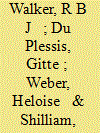

|
|
|
|
|
| Summary/Abstract |
As students and scholars of global politics, we have been witnessing, participating in, and feeling the effects of recent global upheavals. These include specific events, such as the election of Trump and the vote for Brexit, but are better understood through their resulting political effects (e.g., pushing back on migration, hardening national borders, denying climate change, reneging on trade deals, gutting the welfare state, increasing resource extraction, and curtailing rights). Commentators refer to these upheavals in different ways: a rise in populism, reinvigorated nationalism, the new fascism, a polarization of Right and Left, the end of globalization, and posttruth politics. These labels have not only generated a great deal of scholarly debate, they have also helped generate multiple energies, including activism, protest, and politicization. Such developments feel at once totally unprecedented but also eerily familiar. More to the point, they have very different manifestations in different parts of the world; indeed, one of the difficulties of the present moment is the lack of analysis about the global ramifications of these upheavals.
|
|
|
|
|
|
|
|
|
|
|
|
|
|
|
|
| 3 |
ID:
158666
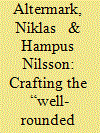

|
|
|
|
|
| Summary/Abstract |
In recent years, counterradicalization work has come to focus on empowering vulnerable communities and individuals through programs implemented by local governments and welfare services. This article examines this new regime of counterradicalization, focusing on how such programs seek to immunize people allegedly susceptible to radicalization by making them “active citizens.” In contrast to the stated ambitions of these programs and much scholarly work on prevention, we do not see counterradicalization by citizenship empowerment as a way of giving back power to the communities where terrorism emerges. Rather, these programs are set up to manage the self-image and behaviors of individuals perceived as “risky,” which means that they operate by shaping subjects. Undertaking an in-depth analysis of two programs of prevention through empowerment, we outline the rationalities underpinning this new way of countering radicalization, showing how they make use of “citizenship” as a political technology.
|
|
|
|
|
|
|
|
|
|
|
|
|
|
|
|
| 4 |
ID:
158663
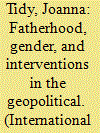

|
|
|
|
|
| Summary/Abstract |
War and peace are gendered and gendering geopolitical processes, constituting particular configurations of masculinity and femininity. When men are considered in relation to war and peace the majority of scholarly accounts focus on soldiers and perpetrators, typically observing their place in the gendered geopolitical solely through military/ized masculinities. In contrast, this article examines fatherhood as a masculine subjectivity, interacting in a nexus with other masculinities to produce an intelligible propeace intervention in war, and considers the implications for our understandings of gender and the geopolitical. To analyze this political subjectivity of what I term “paternal peace,” the article considers the case of Bob Bergdahl. Bergdahl’s son was a US soldier held by a Taliban-aligned group for five years until 2014. During this time Bergdahl was publically critical of US foreign policy, presenting his son’s release as part of a peace process that could end violence in Afghanistan. I unpack how Bergdahl’s public political subjectivity was the outcome of a “gender project” drawing on accounts of “valley” fatherhood in combination with particular forms of diplomatic and military masculinity. I consider how Bergdahl’s intervention was publically received, and how the geopolitical reach of it was pacified within gendered and racialized coding.
|
|
|
|
|
|
|
|
|
|
|
|
|
|
|
|
| 5 |
ID:
158664


|
|
|
|
|
| Summary/Abstract |
A great deal has been written about the role of resilience in world politics in recent years. But where does resilience come from? From which discipline was it “imported” into world politics? A particular genealogical analysis of resilience is structuring much of the literature: resilience was born in system ecology in the 1970s. On the basis of this particular genealogy, many critical theorists argue that resilience is a form of reasoning that participates in a neoliberal rationality of governance. For them, resilience is a by-product of a neoliberal mode of governance; seen in this light, resilience is lamentable. In this article, I propose a different, more extensive genealogy of resilience. I argue that before we can conduct an analysis of the application of resilience in world politics, we must understand the diverse paths through which resilience has percolated into international politics. By tracing the diverse expressions of resilience in world politics to various markers within the history of resilience, this article contends that this is an opportune moment to move scattered scholarships on resilience a step further and better theorize the relationship between resilience and world politics.
|
|
|
|
|
|
|
|
|
|
|
|
|
|
|
|
| 6 |
ID:
158667
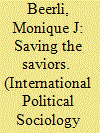

|
|
|
|
|
| Summary/Abstract |
Tracing transformations in the way that humanitarian organizations respond to insecurity in the field, this article examines the bureaucratization and professionalization of security in relation to intraorganizational struggles between humanitarian professionals. Whereas some advocate for the triumph of remoteness and bunkerization as organizing principles of humanitarian action, others challenge the imposition of security as a humanitarian logic of practice through acts of nonconformity. These tensions are illustrative of professional struggles over how to do and think humanitarian action. In articulating a sociological and transversal reading, this article points to the heterogeneity and divisions structuring the humanitarian space. To provide empirical insights into the bureaucratic work practices of headquarters professionals and the everyday practices of frontline humanitarian professionals, this article draws upon an analysis of humanitarian security manuals, interviews with humanitarian professionals, and field observations in Port-au-Prince. The article sheds light on the development of the humanitarian profession and on the novelty of the work practices of humanitarian security professionals, while contributing to debates on bunkerization and the literature on transnational professionals.
|
|
|
|
|
|
|
|
|
|
|
|
|
|
|
|
|
|
|
|
|